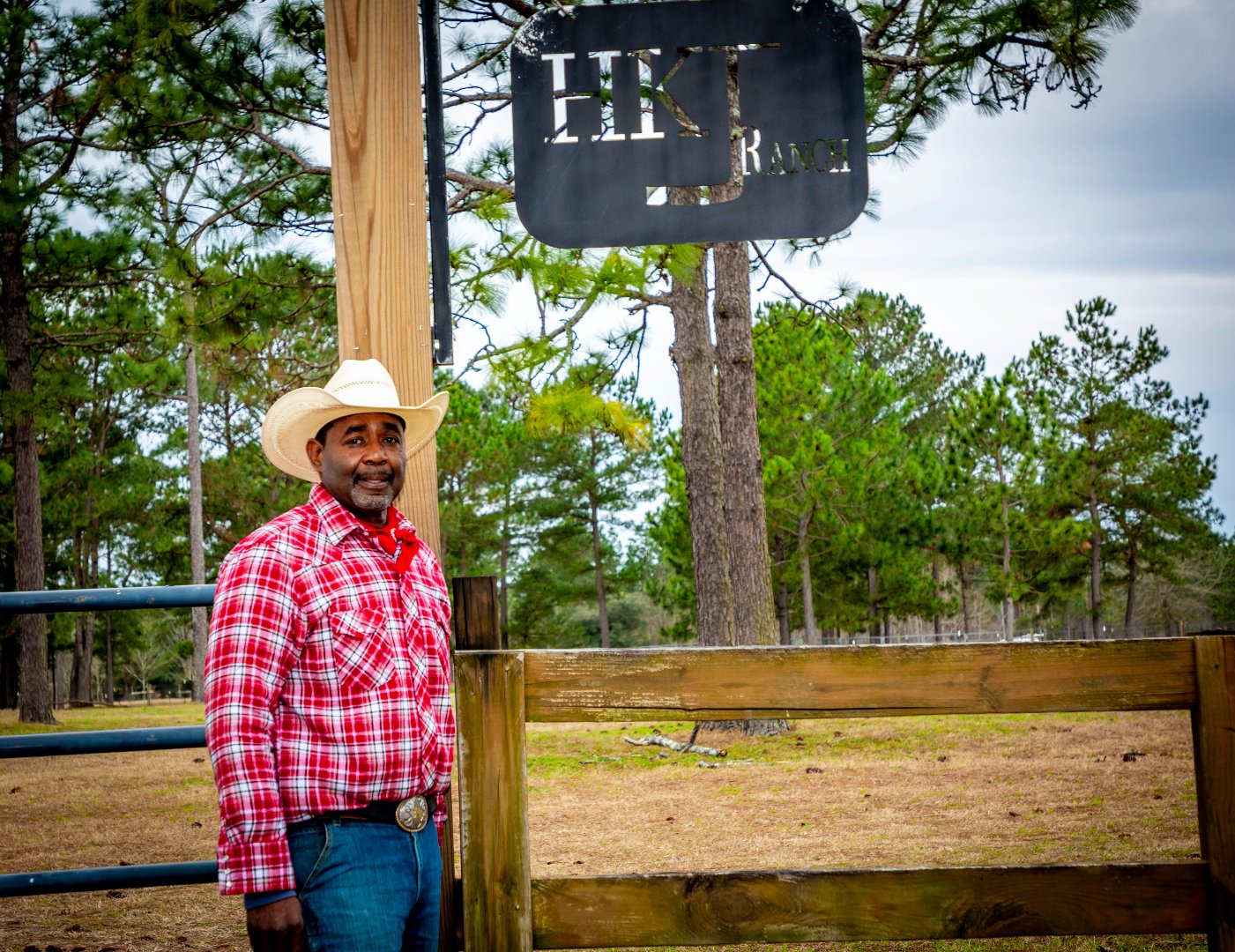Handy Kennedy Jr., operator of HKJ Ranch, values investing, managing and caring for the land that provides for his livestock. The Army veteran said being a good steward requires a commitment of time and resources which are vital for ranchers.
In 2018, Kennedy formed a relationship with Fort Valley State University’s Cooperative Extension Program. Through FVSU Extension specialists and agents, he learned management strategies to run a profitable cow/calf operation.
These strategies included marketing; beef cattle enterprise budgeting; genetic selection; nutrition, forage, herd, and risk management strategies along with carcass merit evaluation. He also developed a more in-depth understanding of expected progeny differences (EPDs), which are predictions of genetics transmitting ability of a parent to its offspring. He used EPD’s to select desired traits for his herd.
He credits professors and animal science Extension specialists, Dr. Ralph Noble and Dr. Nikki Whitley. He also credits Stefan Price, FVSU Extension agent for Bulloch, Tattnall, and Emanuel counties, for assisting him with the incorporation of EPD technology.
Noble said the use of EPD technology has made Kennedy’s operation more profitable and enjoyable. The FVSU professor said Kennedy now knows how to evaluate his herd and how to carefully select a bull that will improve his herd, his calves and increase income. “The progress he’s made is the most I’ve ever seen during my entire professional career,” Noble said.
Kennedy agrees that using proven data and embracing new technology has kept him profitable in the cow/calf business.
“Dr. Noble taught me the entire cattle operation cycle,” Kennedy said. “He showed me how to use it on my ranch to be more efficient and raising beef cattle that add-value at each stage of the cow’s life cycle. Now, I understand how ranchers, who embrace data and technology, have a competitive advantage over those ranchers, who do not.”
In addition to his partnership with FVSU, Kennedy has received assistance from government agencies. Since 2011, the cattle rancher has utilized farm loan programs offered through the U.S. Department of Agriculture (USDA), Farm Service Agency (FSA) He has also received assistance from the Natural Resources Conservation Service (NRCS) Environmental Quality Incentives Program (EQIP) and Conservation Stewardship Program (CSP). These resources and technical assistance services contributed to improving the land, cow/calf operation and purchasing updated equipment to operate a more efficient ranching business.
Kennedy advises small farmers to start with a business plan and livestock enterprise budget. “The agencies are willing to help if they understand your vision, business plan, and see your progress,” Kennedy said.
Expanding Marketing Opportunities
Kennedy serves as one of the founding members of AgriUnity. “AgriUnity thrives on teaching and assisting ranchers on raising value-added cattle, which allows ranchers to have access to other markets to sale their cattle (i.e., directly to consumer, truckloads, online etc.). Our goal is to help ranchers be successful by sharing our experiences and best practices to hopefully mitigate mistakes and improve their cattle operation. Essentially, AgriUnity is a network of goal-oriented ranchers with a shared vision and a collaborative-spirit that allows them to express their passion ranching and make a profit.” Kennedy said.
Learning and adopting new technologies
Handy explained that higher input costs, inefficient processes, and not adopting and adapting to new technologies are the main factors that contribute to lower profit margins. To improve his cattle operation, Kennedy understands the importance of incorporating advanced technological practices “In the past, I spent resources using obsolete processes, outdate technologies, and raising unproductivity livestock,” he said. “Now I invest resources into more robust processes, newer technologies and raising added-value cattle that creates higher profits margins for the ranch.”
Overall, Kennedy aims to take care of the land that takes care of his livestock and family. In addition, to building a community of ranchers that are willing to put the interest of the group ahead of their own personal interest to support communities with the goal of feeding America.

